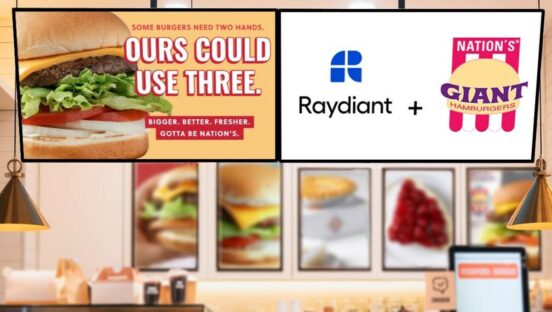Many popular quick-service and fast-casual brands rely on franchising to expand their footprint. Supercharging the entrepreneurial spirit of seasoned operators, while sharing the financial risk, can be an attractive growth strategy for both the franchisor and franchisee. However, the path can be fraught with challenges.
Think about all of the moving parts that need to be locked in and working in unison for a franchised operation to be successful. Amidst that chaos, it’s imperative that the franchisor furnish a comprehensive, resilient, and clear path for operational excellence that will drive profitability and protect brand standards. At the heart of this is the need to provide a robust technology stack that supports the dynamic nature of the franchisor-franchisee relationship in the face of an ever-changing and highly complex operating environment.
Ensuring the brand experience is right every single time
When the franchisor-franchisee relationship works seamlessly it’s a win-win for everyone, including the guest who now gets to enjoy a great new restaurant in their area. The brand is extended and reinforced, and everybody is happy. For this rosy scenario to work though, the franchisor must provide the franchisee with systems and processes that are transferable, scalable and agile.
As a franchisor, if I change my menu or add an LTO, how do I communicate that to my franchisees? Am I shipping them a giant book or a digital file? Or what if the market suddenly changes, as when COVID-19 hit in 2020? How do I ensure that my franchisees have the tools and processes in place to switch from in-store dining to curbside pickup and delivery? How do I share best practices around labor optimization, solve for the complexities of the supply chain or address an ever-changing statutory environment? How do I train my team consistently and comprehensively to ensure that none of these challenges impact the service we provide to our guests?
Listening carefully and reacting to the market is paramount. However, if you don’t have a solid infrastructure in place, your ability to be responsive will be inhibited. In this market, no one has the luxury of moving slowly or sitting still! As important as it is for the franchisor to provide centralized systems and processes, the franchisee also requires a degree of local autonomy, which is critical for things like labor law compliance, regional and cultural taste differences, local statutory requirements, and the fickle nature of regional labor markets.
Finding the right balance between centralized control and local autonomy is tricky but doable, particularly when driven by an integrated technology infrastructure where information is shared freely and efficiently between systems and across the enterprise.
Technology as the enabler between franchisor and franchisee
There are a number of key factors to consider when you’re building the tech stack to support a franchisee community. While the features and functions of the technologies are an important starting point, you also need to consider how the platform integrates with your ecosystem and the strengths of the organization behind your stack. Among critical considerations for your tech partners:
Agility: Are they innovating, and do they have a formal development roadmap that is influenced by their user community? Are they active listeners when you have recommendations? Do they proactively engage with your team? How agile are they in meeting the changing needs of the marketplace? Do they view technology development as a revenue center, or do they consider it a fundamental part of their DNA?
Resiliency: What are their uptime statistics? Do they have a platform that is both performant and resilient? There should be no single points of failure and the entire environment should have proactive alerting when elements of the infrastructure are under duress. What data can they share that would support a claim of five 9’s of uptime? This leads to the next point…
Security: Do they perform SOC1 Type 2 and SOC2 Type 2 audits? In the current environment you need to know that their operating standards and technologies fully embrace the highest levels of security and reliability. These audits ensure that a third party is validating the operating standards of their business and should identify any single points of potential failure. Your tech partners should have no problem making those audits available to you.
Disaster Recovery: Telling you that they do full backups is not sufficient. You need to know the RPO (Recovery Point Objective: How much data is at risk of loss in the event of a catastrophic failure?) and RTO (Return to Operation: In the event of a catastrophic failure, how long will it take for the system to return to being fully operational?) You know the tolerances for your business for RPO and RTO, but generally you should expect RPO under 60 minutes and RTO under 24 hours. Every system could vary, but regardless, you need to make sure your partners have a clear plan in the event of disaster.
Software Quality: You should never be in a position in which you are expected to test the software. You have enough to worry about running your restaurants. You should understand what testing protocols are in place, including their automated testing coverage, stress testing, performance testing, security testing and manual testing. Bad or broken software can be incredibly disruptive to your business.
Service and Support: Stuff breaks. It’s inevitable. However, when it does, do your partners have a track record of excellence in supporting their user community? Have you checked references? Do they have Service Level Agreements? Do they outsource their help desk? Do they provide transparency when cases are created? There is a lot to consider here, but in the end you need to make sure that you have a partner that will answer the phone and be accountable when things do not go exactly as planned.
When you have the right tech ecosystem and you have the right partner, then you are in control of your destiny. You can execute your strategies in this most difficult operating environment and the technology will be an enabling force in meeting your objectives. There is so much complexity involved when building, nurturing and growing your franchise community. Done right, your tech stack will provide a solid foundation on which to operate and succeed.
Bill Bellissimo is the Founder and President of CrunchTime! Information Systems, an industry leading back-of-house restaurant operations platform. Prior to founding CrunchTime in 1995, Bill was the President of a large restaurant chain in the northeastern United States. Before working in the foodservice industry, Bill was a banker on Wall Street.













